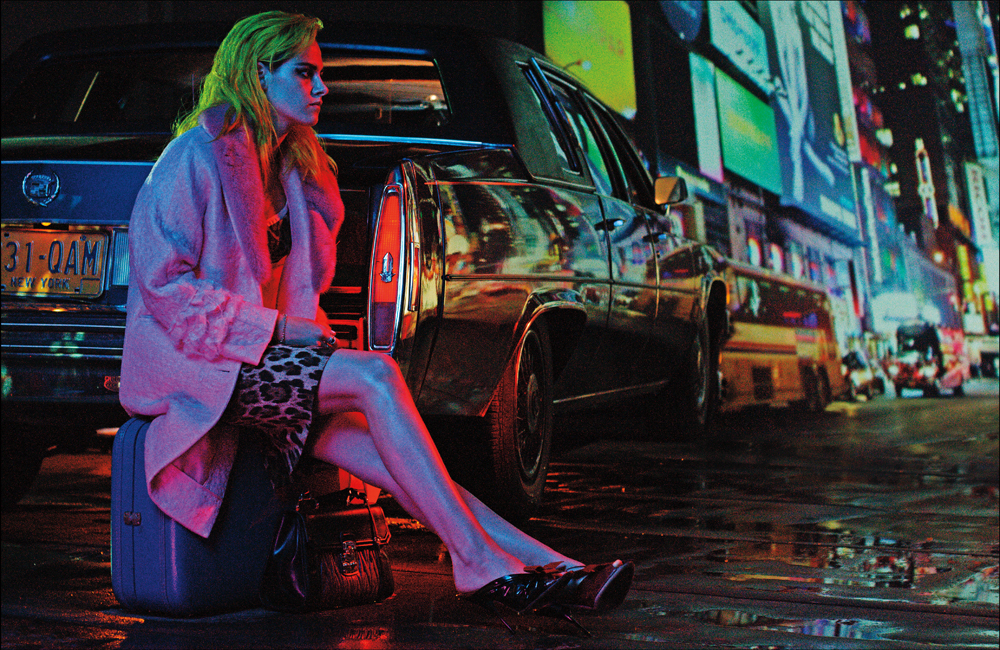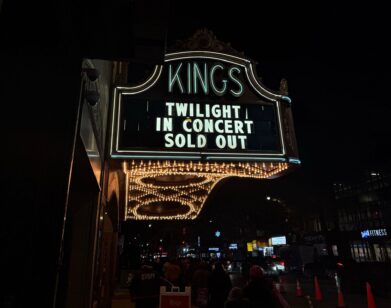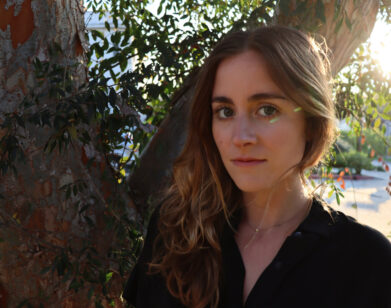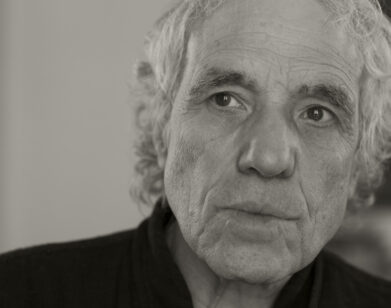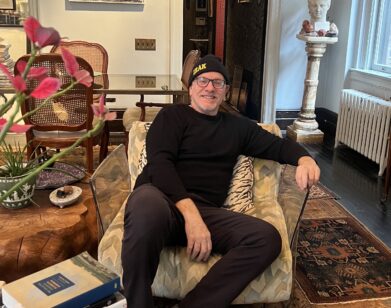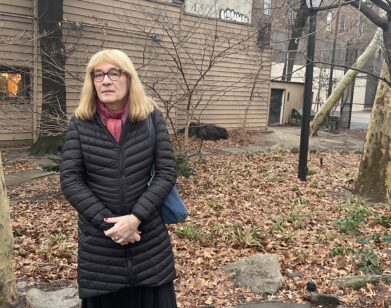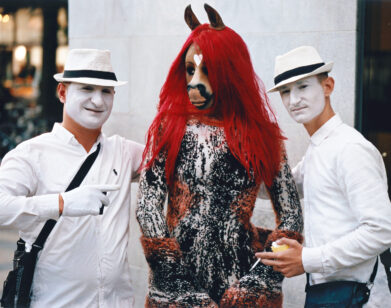Kristen Stewart
“I’m sitting back and enjoying the benefits of a decision that I made when I was a person who I can still relate to but am not anymore.” —Kristen Stewart
Even in close-up, with her eyes the color of Caribbean shallows filling the screen, Kristen Stewart seems to be hiding—or at least trying to. There is a discomfort, often verging on terror, that troubles her lips and pinches her brow, as if she’s been shot up with truth serum and knows she’ll be incapable of hiding her deepest secrets. She seems to recoil from our attention, squirming to shadow something, anything, of herself. This surface tension was the focal point of the five-picture Twilight series, hinging as it did on Stewart’s Bella Swan and her anaerobic inferno of teen love for a vampire, and it has made Stewart the sort of Hollywood poster child for cool, adolescent angst. In films as far afield as Greg Mottola’s comic Adventureland (2009), Sean Penn’s searching and epic Into the Wild (2007), Doug Liman’s silly sci-fi Jumper (2008), all the way up to last year’s heartbreaking Still Alice, Stewart has shown she can play that angst with wry humor, rich feeling, sweetness, silliness, and everything in between.
From her first roles, made before she was a teenager (The Safety of Objects, Panic Room, and Cold Creek Manor), the actress has seemed to be a natural, born to it, as in fact she was. Stewart, now 24, grew up in L.A.—grew up on the film sets where her parents work behind the camera in Hollywood. In her best roles, Stewart has made her candor, the nakedness that she would like to cover up, something more, something gracious even; she seems to have found a way to make her own self-possession heroic. As Joan Jett in The Runaways (2010), the translation from chill movie star to chill rock star is seamless and expectedly wonderful. But even in the Goya-does-Grimm-fairy-tale world of Snow White and the Huntsman, Stewart’s surly and sweet Snow White is spot on. And playing the live-wire Beat Marylou in Walter Salles’s adaptation of Kerouac’s On the Road (2012), Stewart’s cool becomes almost tangible, a magical dust she scatters around her—enchanting, mercurial, luminous.
In this month’s Clouds of Sils Maria, directed by Olivier Assayas, Stewart plays the personal assistant of a great and accomplished actress, played by Juliette Binoche, and for her performance, Stewart was the first American actress to be nominated for the French equivalent of an Oscar, the César, in 30 years. The film is in part about so many of the existential overlaps and intrusions an actress faces in her life and career, from the material and co-workers to things like magazine profiles. And, as Stewart tells her hero, writer and singer Patti Smith, she is not exactly immune to these intrusions herself, but if she’s proud of where she is—and she is—it is only because of the stops she’s made along the path to get there.
———
PATTI SMITH: Hey. Is this weird?
KRISTEN STEWART: It’s so, so weird. You’re going to do a proper interview, huh? That’s cool, I think.
SMITH: How old are you, 24? I just turned 68 and I was thinking about what I was doing at 24. I hadn’t recorded Horses yet. I was still working in a bookstore. I was doing performance, I was writing. But what you’ve already been through and accomplished professionally, it’s kind of amazing. Did you want to be an actress when you were a little girl? What were you thinking about then?
STEWART: Well, I’m sitting back and enjoying the benefits of a decision that I made when I was a person who I can still relate to but am not anymore. I think by default I wanted to be an actor because, on a movie set as a little kid, the only thing that you can do is be an actor. And I was really enthralled by the whole process. At that point I just really wanted to be on sets, going to a thousand different places, and work as hard as my parents work. Both my parents work in film. They’re crew. I love movies, and I just wanted to be involved. I got really lucky. I auditioned for a while and then started making films. I used to say that I always wanted to be the youngest director. But now I’m like, “No, I’m going to wait until I’m properly ready to do that.”
SMITH: When I was a kid, I used to dream about playing Jo in Little Women. Or I wanted to play Joan of Arc. It was daydreaming. We all daydream as children. You had the drive and were in a position where you could realize these dreams and projections. I don’t know if it was your first piece, but I remember the movie you did with Jodie Foster [Panic Room, 2002] when you were, like, 12 years old?
STEWART: Yeah, that was my second movie. It was a long process. I started it when I was 10, wrapped when I was 11, and it came out when I was 12.
SMITH: Wow, you were only 10. I saw some of the interview footage you did when you were probably about 12.
STEWART: Oh, dear.
SMITH: You’re so natural and straightforward. And throughout your films, your characters have that natural, straightforward way of being. Jodie Foster has some of that, and I was wondering if she influenced you as an actor at all, if you learned from her.
STEWART: I was really lucky to work with her at such a young age because I’ve had some serious self-persecuting … People sometimes actually get me to think I take things too seriously and maybe I’m too earnest and it’s coming across like I’m better than them. But working with people like Jodie—we are quite kindred. There’s just something when people look at you and go, “Listen, I know it’s awkward, but just keep being honest.” I could have gotten really unlucky and compared myself to another kind of actress and felt inadequate. I can’t, like, put on the show. I’m not a performer. And it’s hard for people to accept a serious tone from a kid without thinking they’re sort of stuck up.
SMITH: Also when you’re a loner type or a more straightforward type—I know from my own experience that people have always thought I was standoffish or not a team player. But it’s just that you have a trajectory. You know what you’re trying to do and you have to shed all of those things that people want you to drag around. You’re an actress and there are a lot of expectations, Hollywood expectations. But you seem to me not only an actor but a worker, involved in a lot of different disciplines, curious about other disciplines—writing, directing.
STEWART: That’s one thing I value most. I start to lose my mind if I’m not working on something, like breaking my back on something. It’s also very counterintuitive to boil down something so personal, something that requires privacy. All of a sudden, you open it up to the world and put it in a context where you could easily trivialize what you’ve done. If people sense that discomfort, they’re not wrong. It feels weird. It feels unnatural because, suddenly, on a dime, you turn around and go, “Okay, I’m going to let everyone into this!”
SMITH: The work.
STEWART: The work, yeah.
“I can’t, like, put on the show. I’m not a performer. And it’s hard for people to accept a serious tone from a kid without thinking they’re sort of stuck up.” —Kristen Stewart
SMITH: Well, our culture has shifted a lot. When I was a kid, you went and saw movies. You knew very little about the actor’s personal life except what would be, like, in Photoplay or something. We didn’t hear “The Making of…” every single movie, and actors didn’t have to put this tremendous piece of work that they’d done into a sound bite. I’m a fan of movies and television shows, and I don’t expect anything from actors and actresses, or anyone, but good work. What they do. I don’t feel like I deserve a piece of their personal life, or even what they think about the work they do. Does that scrutiny or expectation affect you?
STEWART: It doesn’t get in my way in terms of work, ever. No. I’m always asked about what type of things I want to do, and if I make decisions based on my last project. Say I do a big franchise movie about a vampire that falls in love with a normal girl. It’s like, “Now do you want to show them that you can be a real, serious actor?” It’s like, “Was I not being a real, serious actor?” [laughs]
SMITH: Exactly. I loved your work in those films. I thought the commitment of everyone in those films was true. Like The Hunger Games—if you accept the world that you’re entering, and if the people deliver that world, that’s what we’re looking for.
STEWART: Right. I mean, it was a long process, so it’s hard to generalize about it as a whole. It wasn’t entirely cohesive. We ebbed and flowed. I will definitely acknowledge that. But the intention is so fucking pure in a weird way. Anybody who wants to talk shit about Twilight, I completely get it, but there’s something there that I’m endlessly, and to this day, fucking proud of. My memory of it felt—still feels—really good.
SMITH: You should be, because you developed a character that people wanted to watch—like your favorite comic-strip heroes or how the March girls grow up in the Little Women books.
STEWART: It’s so ridiculous for me to hear you say that. You know, I’ve done a lot at my age, and thinking about how you hadn’t started getting serious-serious, hadn’t recorded an album at 24 … I read Just Kids and I still have not harnessed something that you wrestled down with serious vengeance. It was just so natural to you, the willingness to allow yourself to explore and create and be free, and not know where you were going. You asked if any of that bullshit affects my work, and it doesn’t, but there are other things that affect my quote-unquote “work.” Just Kids made me want—you know, it’s super-romantic and cheesy—but I genuinely started making paintings because of you. I started to believe in other aspects of myself because of that book, because I was like, “Fuck, I should have done this at 17. I should have gotten that feeling.” And one thing that makes me feel completely okay with my lateness is the fact that you are so influenced by other people. You have such a deep love for other people. A lot of artists are such narcissists. It’s very validating and affirming in a way that I really needed. Something happened to me and I became really successful at something at a young age, and that stunts you in every other aspect of your life because you feel like that’s what you’re good at and so that’s what you need to stay in.
SMITH: But the thing is, you are good at what you do, but you’re young. You have lots of ideas. You’ve let me read some of your writing—your ideas are good. I had dreams as a child of what I wanted to do, but I didn’t have to suffer the scrutiny that you did. What I did suffer when I was young was because I was sort of a hick coming into New York City. I was made fun of by a lot of the Factory people. Even Andy Warhol thought I was a hick. I met these people and I had to be strong. I had to either be crushed by these people or chop my hair up like Keith Richards and say, “Fuck you.” But that scrutiny is hurtful, and the rumor mill, the constant bullshit, speculations about your personal life must be very difficult. But in the end, all of that is peripheral. What will remain 20, 30 years from now—all those people and their snarky comments and their projections will be forgotten—but if your work continues to grow and you do great work, that’s what will be remembered. It’s all about work in the end. And you’re not a bit behind. You have learned a lot of technical things, a lot of disciplines. And you can apply everything that you’ve learned from one genre into another.
STEWART: I agree.
SMITH: But I wanted to ask you about that scene in Sils Maria where your character, Valentine, the assistant of a great actress, is going through her lines with her. I loved this scene because it has so many levels. When actresses play actresses, or actors play actors, they have to find another level. Michael Keaton does it in Birdman, where he’s an actor on stage and he finds this moment where he gives the performance of his life. But [Juliette Binoche’s character] is reading her lines—an actress playing an actress—and you see her going into another level, a higher level, just going through her lines. That to me is so fascinating. And your character is very complex; you’re an assistant, helping an actress, not betraying that you, Kristen Stewart, are an actor as well.
STEWART: [laughs] Yes.
“Anybody who wants to talk shit about Twilight, I completely get it, but there’s something there that I’m endlessly fucking proud of. My memory of it felt—still feels—really good.” —Kristen Stewart
SMITH: That was a great piece of work because it requires a certain amount of restraint.
STEWART: The movie is so very much about the work, and the toll that it can take, especially if you’re not somebody who can personally relate to what it feels like to give so much of yourself. But she admires it in this actress. There is compassion, but there’s an acknowledgement that she will forever be isolated. She looks up to her, like, “You have genius. There’s something about you that’s just magical and absolutely undeniable and sort of untouchable, and I’m enthralled by it; I want to get as close to it as I can.” But there’s a distance between them that they’re obsessed with, but they can’t close. One is a fan of art and one is the artist. There’s this desperate need to understand one other—that’s the attraction—but at the same time, I think the reason they’re so attracted is they won’t understand each other.
SMITH: You have a gift for showing restraint. That straightforwardness you have, with a certain amount of restraint, even a little aloofness, it magnifies a certain aspect of the character. In On the Road, Marylou was completely natural. I felt that character; I loved what you did with that character. A lot of times people will try to make a free-spirited character obnoxious or too aggressive. And back in the ’40s and ’50s, a free-spirited girl would still be living within the context of her world, a man’s world. But she lit up the screen, dancing, and even when she is dumped.
STEWART: Thank you. That was probably the hardest for me—to just let go and show a little exuberance.
SMITH: You’re the most exuberant. Even with all of the legendary characters around you, this girl is the one who stands out.
STEWART: Well, she was probably the only person who was considered Kerouac’s equal. A lot of the people we talked to who knew them, biographers and everything, were saying she probably was the purest version of [the Beats’ ideal of a free spirit] because she wasn’t painted with expectation. Nobody knew her. No one cared. So she was always able to remain in the mode that inspired that book. Whereas the two guys, as you say, got kind of spoiled by it.
SMITH: I really like that. What else do you have coming up?
STEWART: I had a really great experience on [the forthcoming sci-fi love story] Equals because of Drake Doremus, who directed the movie. He typically works off an outline, and this was the first movie that he did with a screenplay because it was pretty high concept, and a bigger budget than what he was used to, so it was a necessary step. But it kind of felt like we were working off of each other—me and Nick [Hoult] and Drake. A lot of directors talk a big game about how we’re going to discover something together, and how it’s a meditation, and we’ll figure out why we’re here in the end, and we’ll answer all of our questions, and then, come day five, logistics are down his throat and he’s like, “Okay! Actually, we’re just going to do it like this!” The movie-making process takes over and you have to plan for spontaneity, which is obviously contradictory. So oftentimes you have to settle to fill in the blanks. On Equals, there was no fucking expectation. One day we didn’t finish something; we didn’t feel it, we weren’t in the right mood to shoot it. So we postponed it. There is not a moment where we filled a blank with a lie. Whether the movie is great or shit, I have never felt so free in an environment. And that’s when you’re going to be the best.
SMITH: Whenever we go on stage to do a concert, of course we want to give the people the highest communication possible. Sometimes it comes through just stupid jokes and sometimes it’s some transcendent improvisation or something very simple. The key to it is that it’s a human moment. And to achieve that within a film, which, like you said, with so much preparation, you have to prepare the spontaneity.
STEWART: It’s so rare.
SMITH: But that’s its own gift. I have some friends who are actors. I’ve watched them work. And I would say that of all the arts, acting is the most grueling, thankless. Never apologize for your work. If people don’t accept the Twilight series for what it is, well, fuck them. Millions of people loved that series. It gave them something. It said something about love and honor. And acting is a really hard job. It’s not a romantic job. I’ve watched the hours in makeup, hours sitting around waiting for the lights, or because you lose your light, or it starts to rain, or whatever. And you feel like shit or you have a migraine, but you have to do it, 12, 13 hours a day.
STEWART: It’s funny because all that shit is what I like most. [laughs] I love that feeling, sitting around on set and being like, “Ugh, it’s another fucking four hours until we can go do what we’ve been planning to do for months.”
SMITH: You’re like Robert Duvall’s character in Apocalypse Now. “I love the smell of Napalm in the morning.”
STEWART: Yeah! Exactly.
SMITH: I’m the same way. I’ve got, like, nine guys on a tour bus, a 12-, 13-hour drive from Portland, and there’s nothing to eat and you get in town and everything’s closed and it’s just like… I love it.
STEWART: I know.
“I became really successful at something at a young age, and that stunts you in every other aspect of your life because you feel like that’s what you’re good at and so that’s what you need to stay in.” —Kristen Stewart
SMITH: But it is grueling. People think one lives such a romantic life, but it has its militaristic aspects. So what are you doing now? What are you doing for yourself?
STEWART: I’m writing a poem for the wedding of one of my best friends. And that’s oddly taken up a lot of me, recently. I’m trying to develop a little more faith in my hand, because everything that I do in terms of productivity is always really cerebral. So I’ve made a few paintings. I’m trying to find a crew, too, because I really want to start making my own movies. I just need to find my guys. I need to find a DP, most importantly. I have a couple of producers who are helping me with that. You read my short.
SMITH: I liked it very much. I liked the writing. It was sort of like a long prose poem.
STEWART: Hopefully, the movie feels like that too.
SMITH: Eventually, you want to give your work to the people and you hope that they understand it or embrace it, but don’t be hard on yourself.
STEWART: Right. I definitely have to remember that.
SMITH: Don’t let other people’s conversations about what you’re doing or you’ve done be part of your own conversation. You said a really cool thing on Seth Meyers’s show.
STEWART: [laughs] Oh my God. You’ve done a fair amount of research. That’s so cute.
SMITH: I didn’t do this as research. I’m on the road and I put the TV on and there you came on, so I watched you. And, first of all, I don’t know how you can walk in those shoes because I’m so clumsy.
STEWART: Dude, I can do it for about three minutes.
SMITH: [laughs] But he was asking you about the Twilight series and you said it was an important part on your through-line—do you remember that?
STEWART: Yes. There’s a through-line. People are always comparing shit. Like, comparing Twilight to things and trying to figure out why I’ve made certain decisions that I’ve made, and I always say every single moment that has led me to this moment has made me who I am. Every movie that I’ve done, they don’t stand independently from one another because a little bit of me is in every single one of those, and it’s part of my own personal growth. I don’t think that there’s much hiding that actors can do. If you’re doing good work, you’re showing a part of yourself to someone, so I can’t say that Twilight doesn’t have anything to do with Still Alice and Sils Maria. They have everything to do with each other. They are who I am.
SMITH: I like that, the through-line. Because some work the people love and some work you get tread upon. I know what that tastes like—to be lauded one month, and then a few months later, you do something and they act like—
STEWART: You’ve let them down.
SMITH: Or you’ve totally changed your color or something. And you’re exploring. As Walt Whitman said, we contain multitudes. And an actor gives voice to the many multitudes that we all contain. That’s why we love the movies, why we love our TV shows: we watch different people portray an aspect of ourselves, maybe even one we don’t like. And we have to do all the work we do to get where we are at the moment we’re doing the work we’re doing. This second. And the moment of the work you do in the future. There’s no reason to regret anything. Regret is a waste. Every single thing we do informs us. Just know I’m in your corner from afar.
PATTI SMITH IS A NEW YORK-BASED MUSICIAN, WRITER, AND VISUAL ARTIST. SHE IS AT WORK ON A NEW BOOK.

